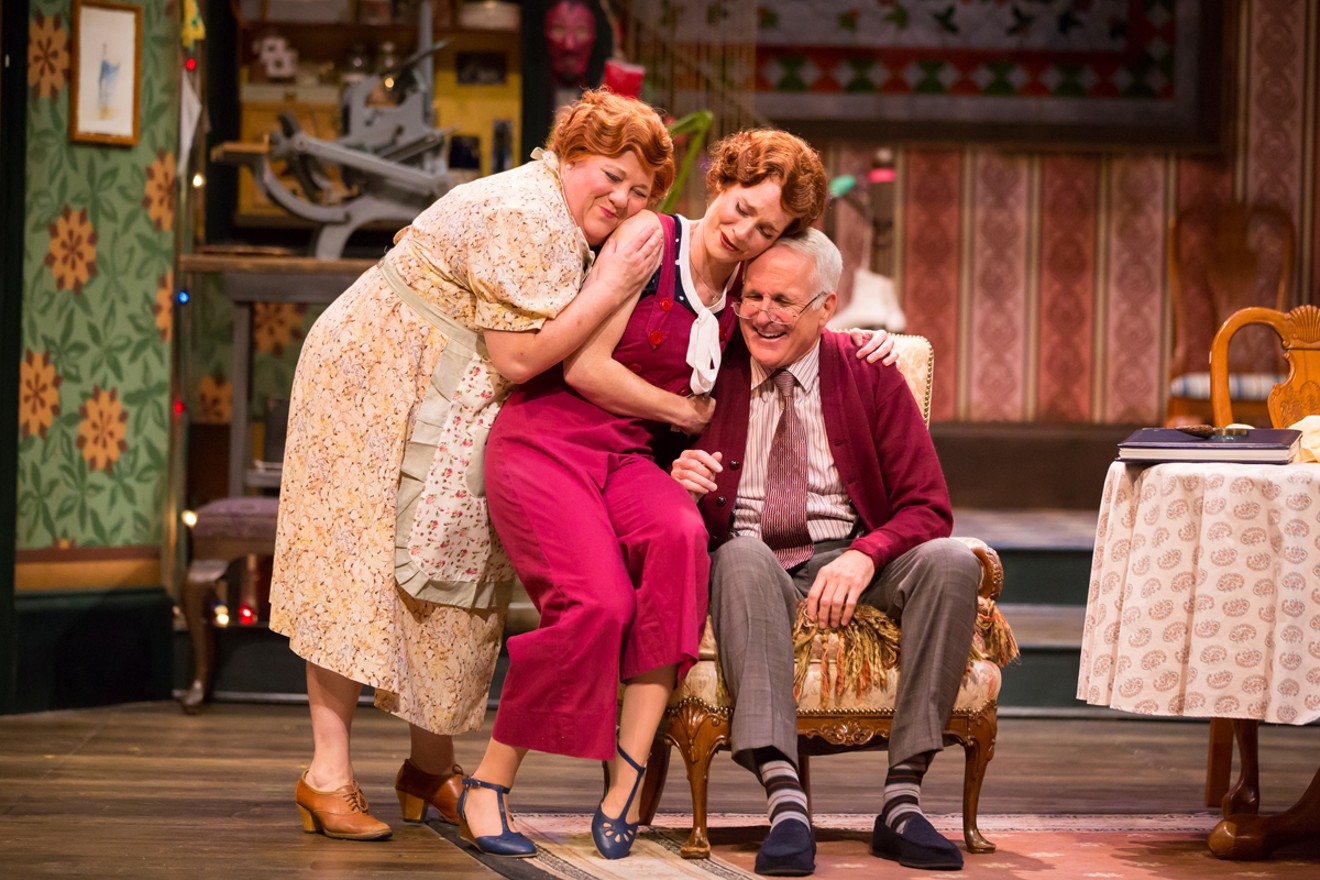I’ve never found the characters in Moss Hart and George S. Kaufman’s You Can’t Take It With You, now playing at the Colorado Shakespeare Festival, as adorable as they seem to find themselves. There’s Penelope, who became a playwright because someone once left a typewriter at the house by mistake; her daughter Essie, a would-be ballet dancer; her husband, Paul, who spends his time building fireworks in the basement with Mr. De Pinna, who showed up some years earlier delivering ice and never left. None of these folks has the remotest talent; all are intense narcissists — though they’re also loving, accepting and protective of each other. And there’s patriarch Martin Vanderhof, presiding genially over the extended family’s antics; he has refused to pay his taxes for years.
The plot concerns those taxes and the way that Vanderhof wriggles out of them. But at the center of the story is the love of the Penelope and Paul’s other daughter, reasonably normal Alice, for Tony, scion of the wealthy and conventional Kirby family. With a get-acquainted dinner planned, Alice is desperately anxious to hide her family’s eccentricities. (Familiar variations on this plot device include Guess Who’s Coming to Dinner?, with Sidney Poitier as the surprise fiancé of the daughter of Spencer Tracy and Katharine Hepburn, and La Cage aux Folles, in which a conspicuously gay couple tries passing as straight for the conservative parents of their son’s fiancée.)
Written in 1936, You Can’t Take It With You is purely escapist, light-as-air entertainment, full of “madcap” and “zany” action. The general theme, articulated by Vanderhof in act three, is to follow your dreams, don’t work at anything you don’t enjoy, create your own reality, celebrate eccentricity, focus on your love for friends and family. It resonated during the dark years of the Great Depression, when the play was a huge success. Still, Grandpa’s homily is a little troublesome: Here’s a group of people who manage to live well enough to hire a maid (African-American in the script, though rarely in contemporary productions) without doing anything remotely productive, preaching the joys of walking off the job at a time when so many Americans were desperate for work.
Still, the CSF production grew on me. Under the direction of Carolyn Howarth, the stage bristles with talent; it’s rare to see a cast so exuberant, vibrant and daring, a group of actors willing to throw themselves into every little bit and shtick with such unabashed enthusiasm — and all of it with close-to-perfect timing. And the tech — costumes, lighting and warmly celebratory set — is altogether more sophisticated than I remember from many previous festival offerings.
As Martin Vanderhof, Sam Gregory holds down the fort with quiet and infectious good humor. I’d use the term “scene stealer” to describe Chloe McLeod’s Essie, because once she gets going, it’s hard to take your eyes off her — but pretty much everyone on stage is merrily stealing at every moment. McLeod mingles the ballet training she’s clearly had with goofily awful moves, fumbling her pirouettes, waving her long, graceful arms, utterly absorbed in her own imagined loveliness. Jihad Milhem is a good-humored Ed, Essie’s husband, creating ripples of silver sound on the xylophone to accompany her mad dancing. And no one will ever steal a scene from bouncy, full-of-life Leslie O’Carroll, tapping away at her typewriter as Penelope. For sheer exuberance, these people are matched by two Russians: Rodney Lizcano’s gloriously rich and fulsome dance instructor, Boris Kolenkhov, and Mare Trevathan’s Grand Duchess Olga Katrina, who now works as a waitress and, when she learns that the family’s idea of dinner is cereal and hot dogs, strides into the kitchen to create a stack of blintzes. (Hasn’t it always been immigrants who livened up the American diet?)
This year, the CSF chose to present only two Shakespeare plays, Richard III and Love’s Labour’s Lost, along with a one-night-only, original practice performance of Edward III, authorship of which is unclear; You Can’t Take It With You and Cyrano de Bergerac fill out the season. While the Shakespeare productions are decently workmanlike, Cyrano and You Can’t Take It With You are the most vital of the summer’s offerings — and Cyrano the most revelatory. The new approach to play selection is clearly fruitful, but perhaps now the festival can also brush up its Shakespeare.
You Can’t Take It With You, presented by the Colorado Shakespeare Festival through August 12, University of Colorado Boulder, 303-492-8008, cupresents.org.
[
{
"name": "Air - MediumRectangle - Inline Content - Mobile Display Size",
"component": "12017618",
"insertPoint": "2",
"requiredCountToDisplay": "2"
},{
"name": "Editor Picks",
"component": "17242653",
"insertPoint": "4",
"requiredCountToDisplay": "1"
},{
"name": "Inline Links",
"component": "18838239",
"insertPoint": "8th",
"startingPoint": 8,
"requiredCountToDisplay": "7",
"maxInsertions": 25
},{
"name": "Air - MediumRectangle - Combo - Inline Content",
"component": "17261320",
"insertPoint": "8th",
"startingPoint": 8,
"requiredCountToDisplay": "7",
"maxInsertions": 25
},{
"name": "Inline Links",
"component": "18838239",
"insertPoint": "8th",
"startingPoint": 12,
"requiredCountToDisplay": "11",
"maxInsertions": 25
},{
"name": "Air - Leaderboard Tower - Combo - Inline Content",
"component": "17261321",
"insertPoint": "8th",
"startingPoint": 12,
"requiredCountToDisplay": "11",
"maxInsertions": 25
}
]












